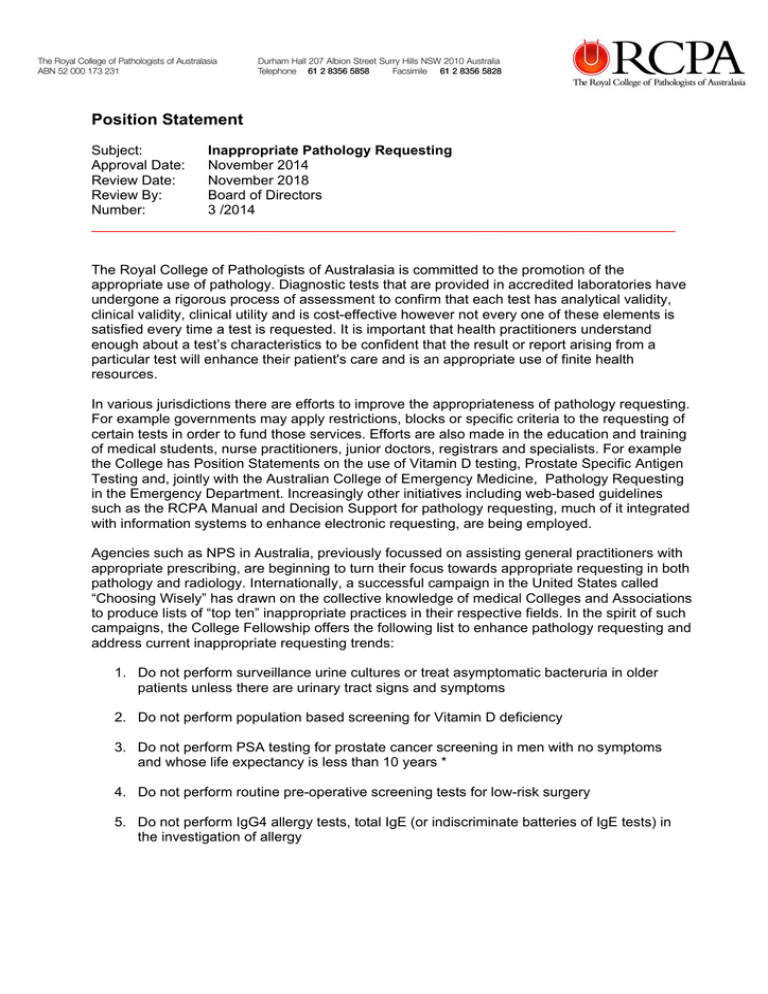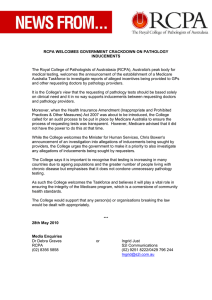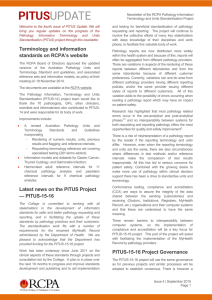Position Statement
advertisement

Position Statement Subject: Inappropriate Pathology Requesting Approval Date: November 2014 Review Date: November 2018 Review By: Board of Directors Number: 3 /2014 __________________________________________________________________________ The Royal College of Pathologists of Australasia is committed to the promotion of the appropriate use of pathology. Diagnostic tests that are provided in accredited laboratories have undergone a rigorous process of assessment to confirm that each test has analytical validity, clinical validity, clinical utility and is cost-effective however not every one of these elements is satisfied every time a test is requested. It is important that health practitioners understand enough about a test’s characteristics to be confident that the result or report arising from a particular test will enhance their patient's care and is an appropriate use of finite health resources. In various jurisdictions there are efforts to improve the appropriateness of pathology requesting. For example governments may apply restrictions, blocks or specific criteria to the requesting of certain tests in order to fund those services. Efforts are also made in the education and training of medical students, nurse practitioners, junior doctors, registrars and specialists. For example the College has Position Statements on the use of Vitamin D testing, Prostate Specific Antigen Testing and, jointly with the Australian College of Emergency Medicine, Pathology Requesting in the Emergency Department. Increasingly other initiatives including web-based guidelines such as the RCPA Manual and Decision Support for pathology requesting, much of it integrated with information systems to enhance electronic requesting, are being employed. Agencies such as NPS in Australia, previously focussed on assisting general practitioners with appropriate prescribing, are beginning to turn their focus towards appropriate requesting in both pathology and radiology. Internationally, a successful campaign in the United States called “Choosing Wisely” has drawn on the collective knowledge of medical Colleges and Associations to produce lists of “top ten” inappropriate practices in their respective fields. In the spirit of such campaigns, the College Fellowship offers the following list to enhance pathology requesting and address current inappropriate requesting trends: 1. Do not perform surveillance urine cultures or treat asymptomatic bacteruria in older patients unless there are urinary tract signs and symptoms 2. Do not perform population based screening for Vitamin D deficiency 3. Do not perform PSA testing for prostate cancer screening in men with no symptoms and whose life expectancy is less than 10 years * 4. Do not perform routine pre-operative screening tests for low-risk surgery 5. Do not perform IgG4 allergy tests, total IgE (or indiscriminate batteries of IgE tests) in the investigation of allergy 6. Do not perform heavy metal tests for non-specific symptoms in the absence of exposure 7. Do not test for Lyme disease for non-specific symptoms in the absence of exposure (travel to endemic areas) 8. Do not perform serum tumour marker tests except for the monitoring of a cancer known to produce these markers 9. Do not routinely test and treat hyperlipidemia in those with a limited life expectancy 10. Do perform high sensitivity D-dimer assay in outpatients rather than imaging to exclude venous thrombo-embolism in patients with a low clinical probability Clearly such lists require updating from time-to-time and do not replace clinical decision-making in individual circumstances. However it helps clarify, from a consensus pathology providers perspective, current areas in need of training and consideration by requestors. *PSA is the only tumour marker supported for screening purposes References: 1. RCPA Position Statement: Use and Interpretation of Vitamin D Testing 2. RCPA Position Statement: Prostate specific antigen testing – age-related interpretation 3. RCPA Position Statement: Diagnostic Laboratory Testing for Borreliosis (‘Lyme Disease’ or similar in Aust and NZ 2



